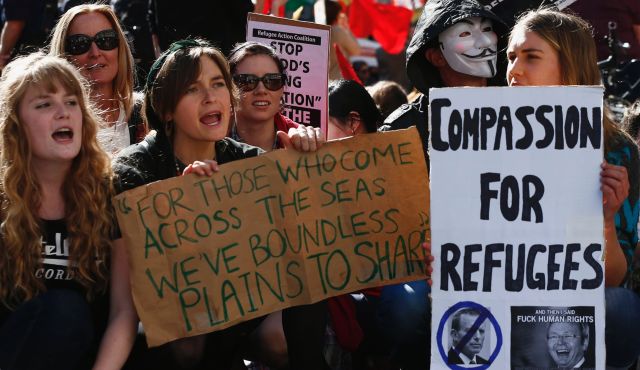In the run-up to the September 7 election, critics are disturbed by the hard-line policies of both major parties.
Dan Goldberg
Haaretz
August 12, 2013
The Labor government’s new policy of banishing asylum seekers who arrive here by sea has left some Jews fuming, many of them survivors of the Holocaust and their descendants who also arrived here as boat people.
Like Israel, Australia holds asylum seekers, most of them from the Middle East, in detention centers. Australia’s centers are on the Pacific islands of Papua New Guinea and Nauru to the north and northeast.
Both countries’ leaders have pledged to “stop the infiltration problem,” as Prime Minister Benjamin Netanyahu put it recently. Both have been criticized by human rights groups for violations of the 1951 UN Refugee Convention, of which they are both signatories.
In 2011, MK Danny Danon (Likud) wrote to Jewish lawmaker Michael Danby, asking if Australia could accept African refugees who had sought asylum in Israel. Danby responded that Danon’s proposal was “quite unrealistic.”
“Asylum seekers who come here by boat without a visa will never be settled in Australia,” Prime Minister Kevin Rudd said on July 19 when he announced the policy ¬ which is rankling some prominent Jewish voters ahead of the upcoming federal election.
“I understand that this is a very hardline decision,” Rudd said. “But our responsibility as a government is to ensure that we have a robust system of border security and orderly migration, on the one hand, as well as fulfilling our legal and compassionate obligations under the refugees convention on the other.”
The new policy prompted Josh Bornstein, a prominent Jewish lawyer, to declare that he was abandoning his lifelong support for the Labor Party.
“I cannot stomach voting for a government that treats other human beings in this way,” Bornstein wrote in Melbourne’s The Age newspaper. “A line has been crossed.”
Bornstein, whose grandparents fled Poland in 1938, told Haaretz: “Rudd’s policy, like that of [Tony] Abbott’s, is brutal. It relies on abusing the human rights of one group of refugees to deter another group.”
Tony Abbott, the leader of the opposition Liberal Party, has campaigned on a similarly hard line, pledging to appoint a senior military commander to lead a task force to help the navy intercept boats and tighten border security.
To the polls next month
Rudd recently declared that the election would be held on September 7, sparing the nation’s 110,000-plus Jews a clash with Yom Kippur by changing the schedule set by Julia Gillard before she was dramatically deposed from the top job six week ago.
Since Rudd’s return to power in late June, Labor has enjoyed a bounce in public opinion, but a recent survey by Newspoll Market Research predicted that the conservative Liberal Party would win by 52 percent to 48 percent. If this happens, Attorney General Mark Dreyfus and Parliamentary Secretary for the Arts Michael Danby, two Jewish government MPs, will return to the opposition.
Labor indeed could find itself losing support if the sentiment expressed by award-winning Australian author Arnold Zable spreads. “I am deeply distressed and disturbed by the current hard-line policies of both major parties,” he told Haaretz. “The true measure of the moral level of society is how it treats its most vulnerable people,” said Zable, whose parents were Polish-born Jewish refugees.
Mark Leibler, national chairman of the Australia/Israel & Jewish Affairs Council, a privately funded lobby group, blasted the politicization of the issue in the “election campaign hothouse.”
“I fear that by appealing to the basest instincts in our society Australians are being led into a dangerous void, filled by fear – in some cases, xenophobic – and vilification,” Leibler wrote in Fairfax Media publications.

